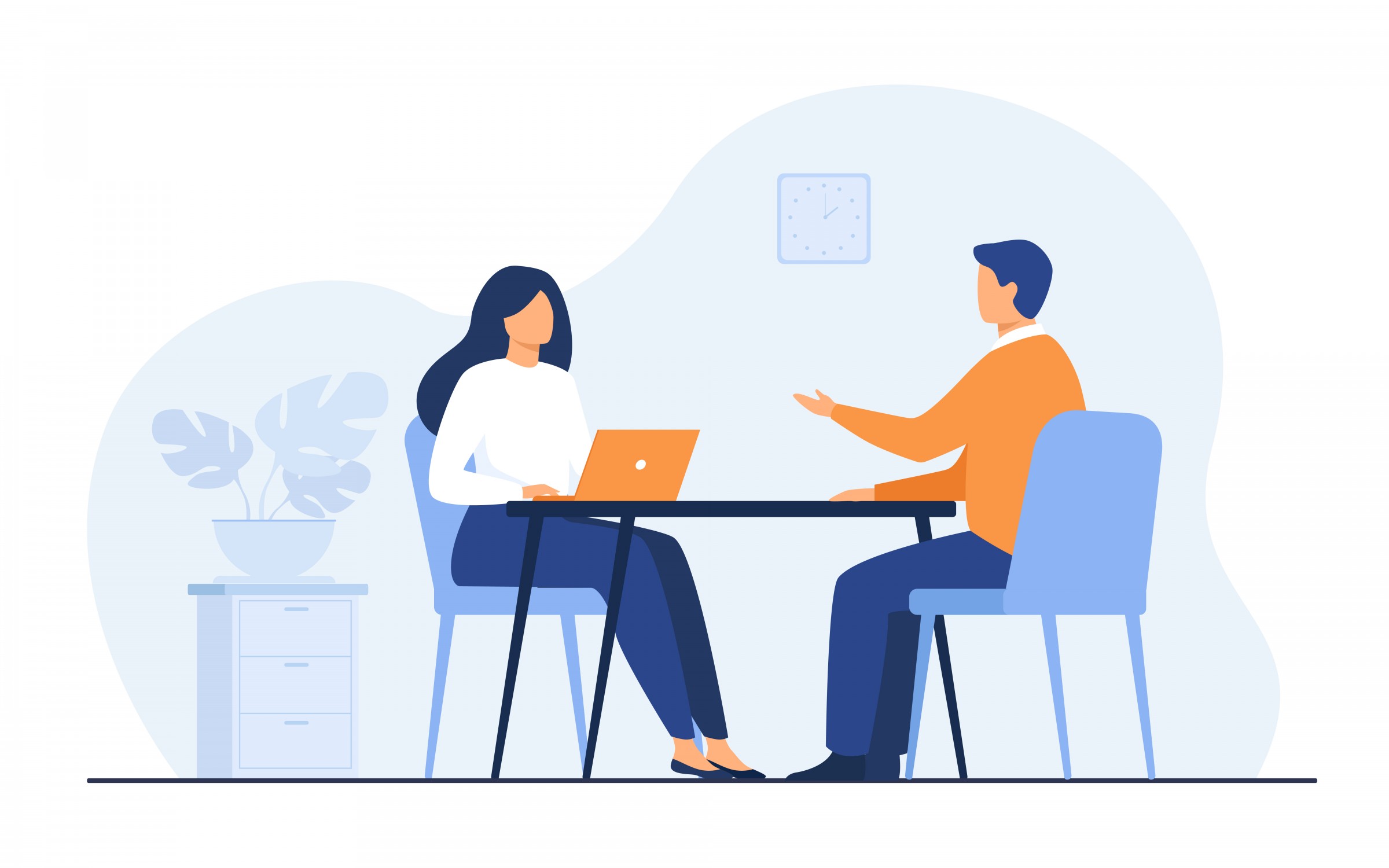Top Interview Tips to Secure A Job in A Data Centre
So you have decided to start a new career in a data centre and you are wondering what to expect, how to prepare, wondering about the interview process, what questions they will ask, will it be formal or informal, and how can you stand out from the competition?
Well I am here to help guide you through the process and give you some insight on how to secure a job in a data centre. As experts in data centre recruitment, these are some of the pointers we share with our candidates.
Step 1: Putting together you CV for a Data Centre job

It’s a good idea to tailor your CV somewhat toward each individual role you’re applying for.
Have a look at some of our tips on how to structure your CV, where we have information regarding CV building, provide an example of the ideal CV structure and help you prepare your CV for a better success rate.
Step 2: Engaging with an IT Recruiter

Computer vector created by pch.vector – www.freepik.com
Once you’ve applied, what happens next?
If you’ve applied directly to a company, chances are you’ll have to wait a while. Most in-house recruitment teams will wait until they have a certain number of applicants, before they begin to engage.
If you’ve applied to a recruitment agency, you’ll generally receive a call, or an email within a few days. This will ordinarily be an informal call discussing the job and the company in more detail so you can get a sense of what it’s really all about.
Most job ads will include which recruiter is working on that particular role so why not connect with them, send a message and introduce yourself, this will emphasise your interest in the role.
Questions a recruiter will ask:
-
They will talk about your experience in IT and your previous jobs, and responsibilities. Remember that your IT knowledge may not be limited to (or even include) professional/formal experience. Be sure to steer the conversation toward that, whenever you can.
-
They will go through your CV and get a few more nuggets of information such as your availability to interview and notice period.
-
They may ask why you are looking to leave your current job, as they want to see if this can be avoided in your new role. Be honest with the recruiter as you do not want to be in the same situation a few months down the line.
-
If there are any gaps in your CV, they will ask about this. It might be due to relocating, redundancy, upskilling, travelling etc., it’s good to have this included on your CV, just pop in the dates and the reason for the gap in between jobs. This may also be discussed in the interview process.
-
What you’re looking for in your next job, think if you had the choice of two roles, what would make you pick one over the other? Career progression, an interesting project, leadership?
The recruiter will then put all the information together along with your CV and decide whether or not to send it across to the Hiring Manager. If the recruiter thinks you will be a good fit for the job then your CV is then sent over to the Hiring Manager who will then assess and decide whether or not to proceed to the next round.
Step 3: Job interview

Computer vector created by pch.vector – www.freepik.com
If the Hiring Manager is happy with your profile, you’ll then progress to the next stage- the interview. This will more than likely be conducted online. Your recruiter will send you a link to this online meeting so, keep an eye out for it and make sure to add it into your calendar.
If you apply for a Data Centre job with us, our recruitment consultant will most likely set up a test video call with you, to ensure that the microphone and camera is working perfectly on your device. They will also conduct a mock interview, to ensure you’re prepped and ready for the actual interview.
Some companies prefer a formally dressed candidate but most actually like to keep it casual. It is best to ask your recruiter’s advice on this so that you feel comfortable in the interview. As they deal with the company on a regular basis, they will have a better understanding of the company culture.
The interview duration may change depending on the company. It could take 20 minutes, it could take over an hour. Point being, don’t plan anything immediately after your interview – you’ll risk either being late, or distraction from your interview as you’ll be looking at the clock.
How to prepare for an interview in a Data Centre in Dublin:
-
You will need to make sure you have a quiet place to interview
-
Make sure you have full battery and good signal/wifi
-
Do your research! This is a very important part of the preparation stage and knowing your stuff about the company, role and the team can put you ahead of other candidates.
-
I would advise looking at more than just the job description and their careers page. Look up articles and get an insight of what the company is working on. The more knowledge, the better.
-
Know your CV inside out and be able to expand on the points covered on your CV. Present examples, discuss what you have accomplished and what your successes have been.
-
Have answers prepared to questions you know will more than likely be covered and having answers prepared will take away some of the pressure. (I have listed some of the common interview questions below.)
-
Look over the job description again, look at the tools and technologies listed, expect questions on these. Also look at the responsibilities and try to relate your experience back to these and have examples ready.
-
Be yourself, companies are looking for diversity and not the one size fits all approach.
-
Use the STAR interview technique when answering questions. This method is used for competency based interview questions. Star stands for Situation, Task, Action and Result. This is a structure to follow so you can explain your answer smoothly and cover all the areas they are looking for.
Situation – Explain the situation that you were in, give the interviewer a bit of background so they can understand the situation.
Task – Explain the goal you were working towards.
Action – Describe the actions you took to achieve this goal and try to keep the focus on your role in the task rather than the team as a whole.
Result – Describe the outcome of your completed sanctions and what you accomplished, what did you learn, what you would do differently. -
Always have questions ready for the interviewer, this will give you a better insight into the role and the team and it will also show that you took initiative and are interested in the position.
Questions to ask in an interview should be about the current project, the team structure, culture, reporting structure etc.
Questions to expect in your interview:
-
Expect technical questions relevant to the job. For example, if it is a hardware role, then expect troubleshooting questions and questions on the different components of a server/computer.
-
If it is a network role, then expect questions about networking fundamentals, expect questions on the tools and technologies listed in the job description, and your experience using them, etc.
-
Expect general questions too, this is to assess your personality for a culture fit, see if you would do well with the company’s leadership, the company’s vision(I recommend looking at the company’s vision statement)
-
Why are you leaving your current role? Make sure you have a good reason for why you are leaving, it could be career progression, looking to work with new technologies, etc.
-
What are your main responsibilities in your current role? Try to relate any previous job responsibilities to ones that are on the job description.
-
What skills do you think will be transferable from previous jobs to this one?
-
Why do you want to work for us? Let them know why you chose to apply, what interests you about the company or project. This is where your research of the company comes in and can help you answer this question and shows your interest in the company.
-
What made you apply for the job?
-
Why do you want to work in a data centre? What interests you about data centres?
Step 4: The feedback loop

Business vector created by katemangostar – www.freepik.com
People vector created by pch.vector – www.freepik.com
You have completed the interview process, what happens now?
You should hear back from your recruiter within a couple of days, sometimes a little longer depending on how many interviews were conducted. Whoever interviewed you will sit down with the team and make their decision.
Your recruiter will inform you if you have been successful or not. They will ask for references and more than likely do a full background check so make sure you have their contact details ready to go.
Step 5: Success!

Congratulations! You were a hit in the interview and they would like to proceed. From this point, a start date will be confirmed and a salary/daily rate as well, if it is a contract role. A contract will then be drawn up and signed by both parties and an induction day will be arranged.
You can now start your exciting career in a Data Centre which has its benefits such as working with the newest technologies, plenty of career progression and there are options for permanent and contract work with great salaries and daily rates.
If the information in this blog caught your attention and you do think a career in a Data Centre is something you would be interested in working in and would like to discuss this further, reach out to us via our website and be kept up to date with our newest Data Centre jobs in Ireland.
